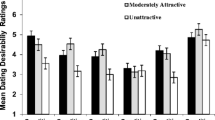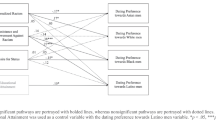Abstract
This study aimed to examine the relationships between five-factor personality traits and mate selection strategies. The participants consisted of 377 university students, aged 19–29, who had never been married. The data were collected by means of an Adjective Based Personality Test and an Inventory of Mate Selection Strategies. Canonical correlation technique was employed for data analysis. As a result of this, it was decided to evaluate the first canonical function. This evaluation revealed that individuals with a high level of conscientiousness and a low level of neuroticism and openness to experience attached importance to virginity, as well as to religious and political similarities. Thus, it was found that there were significant relationships between five-factor personality traits and mate selection strategies.

Similar content being viewed by others
Data Availability
The datasets generated during and/or analysed during the current study are available from the corresponding author on reasonable request.
References
Akoğlu, Ö. A., & Küçükkaragöz, H. (2018). Boşanma nedenleri ve boşanma sonrasında karşılaşılan güçlüklere ilişkin bir araştırma: İzmir ili örneği (A research on the reasons of divorce and difficulties encountered following divorce: A case study in İzmir). Toplum ve Sosyal Hizmet, 29(1), 153–172.
Altuntaş, S., & Atli, A. (2015). The development of choosing partner strategies inventory. Mustafa Kemal University Journal of Social Sciences Institute, 12(32), 123–135.
Atari, M., & Chegeni, R. (2017). The dark triad and long-term mate preferences in Iranian women. Personality and Individual Differences, 104(1), 333–335. https://doi.org/10.1016/j.paid.2016.08.031.
Bacanlı, H., İlhan, T., & Aslan, S. (2009). Beş Faktör Kuramına dayalı bir kişilik ölçeğinin geliştirilmesi: Sıfatlara dayalı kişilik testi (SDKT) (development of a personality scale based on five factor theory: Adjectıve based personality test (ABPT). Türk Eğitim Bilimleri Dergisi, 7(2), 261–279.
Botwin, M. D., Buss, D. M., & Shackelford, T. K. (1997). Personality and mate preferences: Five factors in mate selection and marital satisfaction. Journal of Personality, 65(1), 107–136. https://doi.org/10.1111/j.1467-6494.1997.tb00531.x.
Bozgeyikli, H., & Toprak, E. (2013). University youth’s mate selection criteria by rank order judgments scaling. Journal of Youth Research, 1(1), 68–87.
Bugay, A., & Tezer, E. (2008). Üniversite öğrencilerinin evlenecekleri eşlerde aradıkları özellikler (the criterias that the graduate students seek in their partners). Dokuz Eylül Üniversitesi Buca Eğitim Fakültesi Dergisi, 23, 36–40.
Efe, E. (2013). Üniversite öğrencilerinde eş seçme eğilimleri (college students’ mate selection tendencies). (Master’s thesis). Retrieved from https://tez.yok.gov.tr/UlusalTezMerkezi/.
Holtzman, N. S., & Strube, M. J. (2013). Above and beyond short-term mating, long-term mating is uniquely tied to human personality. Evolutionary Psychology, 11(5), 1101–1129. https://doi.org/10.1177/147470491301100514.
Jonason, P. K., Li, N. P., Webster, G. D., & Schmitt, D. P. (2009). The dark triad: Facilitating a short-term mating strategy in men. European Journal of Personality, 23(1), 5–18. https://doi.org/10.1002/per.698.
Jonason, P. K., Luevano, V. X., & Adams, H. M. (2012). How the dark triad traits predict relationship choices. Personality and Individual Differences, 53(3), 180–184. https://doi.org/10.1016/j.paid.2012.03.007.
Kaba, G. K., & Öztürk, E. (2018). Karara bağlanan boşanma davalarının retrospektif incelenmesi: Gaziosmanpaşa örneği (retrospective investigation of adjudicated divorce cases: Gaziosmanpaşa sample). Turkiye Klinikleri Adli Tıp ve Adli Bilimler Dergisi, 15(2), 52–60.
Kalkan, M. (2012). Eş seçimi ve eş seçiminde önemli faktörler (Mate selection and important factors in mate selection). M. Kalkan ve Z. Hamamcı (Eds.), Evlilik Öncesi Psikolojik Danışma (Premarital Counseling). Ankara: Anı Yayıncılık.
Keklik, İ. (2011). Mate selection preferences of Turkish university students. Eurasian Journal of Educational Research, 44, 129–148.
Keldal, G. (2016). Personality traits as a predictor of university students' attitudes towards marriage. Proceedings of 1. International Academic Research Congress, Antalya, Turkey, 2383-2388.
Keldal, G., & Atli, A. (2020). Predictors of Turkish university students’ marital attitudes. Current Psychology, 39(4), 1354–1361. https://doi.org/10.1007/s12144-018-9842-6.
Kline, P. (1999). The handbook of psychological testing (2nd ed.). New York, NY: Routledge.
Probst, S, S. (1998). Long-and short-term mating strategies and the five-factor model of personality (doctoral dissertation). Available from ProQuest dissertations and theses database. (UMI no. 9920082).
Roccas, S., Sagiv, L., Schwartz, S. H., & Knafo, A. (2002). The big five personality factors and personal values. Personality and Social Psychology Bulletin, 28(6), 789–801. https://doi.org/10.1177/0146167202289008.
Sancak-Aydın, G., & Demir, A. (2017). Lisansüstü öğrencilerinin eş seçimini etkileyen ve sınırlandıran görüş ve inançları (opinions and beliefs affecting and limiting the mate selection of graduate students). Ege Eğitim Dergisi, 18(2), 627–652. https://doi.org/10.12984/egeefd.322401.
Schmitt, D. P., & Shackelford, T. K. (2008). Big five traits related to short-term mating: From personality to promiscuity across 46 nations. Evolutionary Psychology, 6(2), 246–282. https://doi.org/10.1177/147470490800600204.
Tabachnick, G. B., & Fidell, L. S. (2012). Using multivariate statistics (6th ed.). Boston, MA: Pearson.
Tsoukas, A., & March, E. (2018). Predicting short-and long-term mating orientations: The role of sex and the dark tetrad. The Journal of Sex Research, 55(9), 1206–1218. https://doi.org/10.1080/00224499.2017.1420750.
Turkish Statistical Institute (TURKSTAT). (2019). Evlenme ve boşanma istatistikleri [Marriage and divorce statistics]. Retrieved from http://www.tuik.gov.tr/PreTablo.do?alt_id=1060#.
Uğur, S. B. (2014). The divorce-related experiences of women in contemporary society: A study of the female academician. Mediterranean Journal of Humanities, 4(2), 293–326.
Yıldırım, İ. (2007). Partner selection among college students. Turkish Psychological Counseling and Guidance Journal, 3(27), 15–30.
Acknowledgements
An earlier version of this study was presented as an oral presentation in the IVth International Eurasian Educational Research Congress (Denizli, Turkey) held on 11-14 May 2017.
Author information
Authors and Affiliations
Corresponding author
Additional information
Publisher’s Note
Springer Nature remains neutral with regard to jurisdictional claims in published maps and institutional affiliations.
Rights and permissions
About this article
Cite this article
Keldal, G. The relationships between personality traits and mate selection strategies of Turkish young adults. Curr Psychol 41, 5258–5263 (2022). https://doi.org/10.1007/s12144-020-01044-0
Published:
Issue Date:
DOI: https://doi.org/10.1007/s12144-020-01044-0




